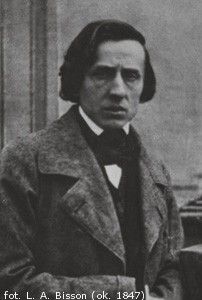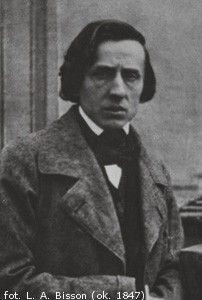Chopin Fryderyk
-
composer, performer
A calendar of the composer’s life and the list of works
1810Fryderyk (Frédéric) Chopin was born on 1st March (or, according to some historians, 22nd February) 1810 in the Żelazowa Wola country house in Mazowsze (Mazovia), 60 km west of Warsaw. His father Mikołaj (Nicolai) was a Frenchman from Lorraine who came to Poland in 1787 with Jan Adam Weydlich, administrator of Count Michał Pac’s estate in Nicolai Chopin’s home village of Marainville. Frédéric’s mother, Justyna née Krzyżanowska, was related to Countess Ludwika Skarbek, owner of the Żelazowa Wola estate. The Chopins lived in the annexe of the Skarbek house and Nicolai tutored the Count’s sons. On 23rd April, Fryderyk Franciszek Chopin was baptised in the medieval St Roch’s Church in the neighbouring village of Brochów.
On 1st October, Nicolai Chopin took up his duties as teacher in Warsaw Grammar School. The Chopin family moved to Warsaw.
1816
Frédéric took up piano lessons with Wojciech Żywny; he had earlier spent much time at the piano with his mother.
1817
Chopin composed his first piece, Polonaise in B-flat Major, written down by his father. The G Minor Polonaise, composed in the same period, was soon printed by the parochial music printing house of the Annunciation Church in the New Town, Warsaw.
1818
Chopin’s first performance at a charity concert; he played Piano Concerto in G minor by the Czech composer Adalbert Gyrowetz.
1822
The lessons with Wojciech Żywny came to an end and Chopin started to study composition with Józef Elsner and organ with Wilhelm Würfel.
1824
A summer holiday in Frédéric’s school friend’s family estate in Szafarnia, a traditional Mazovian village. Frédéric became acquainted with Mazovian and Jewish folklore, and composed the Mazurka in A Minor “a Jew”. Later he stayed in the countryside several times, always taking a lively interest in the local folk music.
1825
Chopin’s Opus 1, Rondo in C Minor, was published.
1826
Chopin began formal composition study with Józef Elsner in Warsaw’s Central Music School (then part of Warsaw University). Three years later, in his final opinion for the ministry of education, Elsner wrote: “Szopen Friderik – a special aptitude, a musical genius.”
1829
During a stay in Vienna, Chopin gave two concerts in Kärntnerthortheater. The Viennese press wrote: “In Mr Chopin, we have found one of the most outstanding pianists, full of delicacy and deepest emotion.”
1830
Chopin composed Concerto in F Minor op. 21, first performed on 17th March at his first composer concert in the National Theatre in Warsaw, conducted by Karol Kurpiński. Maurycy Mochnacki wrote: “Chopin is all dedicated to the genius of music, with which he breathes and which inspires him.”
On 11th October, Chopin gave his farewell concert before he left Warsaw (as it later occurred - never to return) for Vienna and Paris. The concert presented his new Concerto in E Minor op. 11, hailed by the press as “the work of a genius”.
On 2nd November, Chopin departed from Warsaw, having listened to the farewell cantata Born in the Polish Land by Józef Elsner.
The news of the outbreak of the November Uprising against the Russian rule (on 29th November) reached Chopin in Vienna. His friends and family dissuaded him from returning to the country at war, but he wrote, “I curse the moment of my departure.”
1831
On 8th September, the November Uprising was eventually suppressed as Warsaw fell to the Russians. Chopin was then in Stuttgart, where, according to tradition, he composed the Study in C Minor op. 10 no. 12 “Revolutionary” .
In the same month, Chopin reached Paris.
1832
Chopin’s first concert in Paris, in Salle Pleyel, where he played his F Minor Concerto as well as the Variations on the Aria “La ci darem la mano” from Mozart’s opera “Don Juan” op. 2. After the concert, the press announced “a revival of piano music”. In July, the Variations on the Aria from Mozart were played in Leipzig by the famous pianist Clara Wieck, wife of Robert Schumann. The latter, commenting on this piece, said “Hats off, gentlemen, here comes a genius.”
1833
In January, Chopin became a member of the émigré club – Polish Literary Society, presided over by Prince Adam Czartoryski.
On 15th December, Chopin played Bach’s Concerto for Three Keyboard Instruments with Ferencz Liszt and Ferdinand Hiller in the Parisian Conservatory. Hector Berlioz wrote enthusiastically about this performance.
1834
Chopin refused to submit an application for a passport to the Russian embassy in Paris and chose the status of a political refugee, which meant that he would never see his homeland again.
1835
On 26th April, Chopin played with an orchestra Introduction and Grand Polonaise in E-flat Major op. 22 – with great success. In August, he met his parents in Karlsbad, where they went to receive spa treatment.
1836
In September in Dresden, Chopin proposed to the 17-year-old Maria Wodzińska. His proposal was accepted, but conditionally: during a one-year trial period, Chopin was to take care of his frail health by changing his lifestyle. In October in Paris, he met the then thirty-two-year-old George Sand for the first time, and noted his reaction: “What a loathsome woman she is!”
1837
The Wodziński family withdrew from the plan of Chopin’s marriage to Maria. On a bundle of letters from Maria Wodzińska, Chopin wrote: “My misery.”
1838
In May, Chopin got closer to George Sand, in July Eugene Delacroix made sketches for their portrait together, and in October they left for Majorca, where their affair was to reach its culminating point. They stayed there until February of the next year, living, among others, in the derelict Carthusian monastery in Valldemosa. The damp climate and wintry weather badly affected Chopin’s health. In Majorca, he completed one of his greatest artistic achievements, the cycle of 24 Preludes.
1839
Having left Majorca, Chopin and George Sand spent three more months in Marseilles, also taking a trip to Genoa, and then went to George Sand’s estate in Nohant in central France. Here Chopin wrote his Sonata in B-flat Minor with the “Funeral March”, and studied Johann Sebastian Bach’s Das Wohltemperierte Klavier.
In October, Chopin returned to Paris, keeping secret his relationship with George Sand.
1840
Together with George Sand, Chopin attended the great Polish poet Adam Mickiewicz’s lectures in Collège de France.
1841
Another summer in Nohant. Chopin spent all the summers there until 1846.
1842
Enthusiastic reviews after a concert in Salle Pleyel: “Chopin has reached his peak.”
1844
A meeting with his sister Ludwika and her husband in Paris, then they stayed together in Nohant.
1845
During a stay in Nohant, first major conflicts with George Sand and her son Maurice.
1846
In February, together with George Sand Chopin took part in a ball organised by the Czartoryski family. His last summer in Nohant, marked by bitter conflicts. Chopin wrote Nocturnes op. 62 and Mazurkas op. 63.
1847
In George Sand’s violent argument with her daughter Solange, Chopin took her daughter’s side.
1848
On 16th February in Salle Pleyel, Chopin gave his last Parisian concert, drawing rave reviews. On 4th February – his last, accidental meeting with George Sand. From April till November, Chopin stayed in England and Scotland, giving concerts and lessons. On 16th November in London, he gave his last public concert. In that year, he wrote his last finished works: Waltz in A Minor and Mazurka in G Minor.
1849
Chopin wrote sketches for his last, unfinished work, the Mazurka in F Minor. After two haemorrhages on 22nd June Chopin was diagnosed by the physician as having tuberculosis in the final stage. On 9th August, Chopin’s sister Ludwika came to Paris with her husband and daughter. On 15th October, Delfina Potocka sang for Chopin. The composer received the sacrament of the last ointment. He requested that his heart be taken out after his death, and brought to Poland. He died on 17th October, at 2 a.m. After the dissection on 18th October, his embalmed body was laid in the crypt of St Magdalen’s Church.
On 30th October, the funeral was held in St Magdalen’s Church. Chopin’s body was buried in the Père Lachaise Cemetery, and his sister Ludwika took the composer’s heart to Poland, where it was encased in the pillar of St Cross Church in Krakowskie Przedmieście Street. In 1880, an epitaph by Leandro Marconi was unveiled.
COMPOSITIONS
- for solo piano:
Allegro de concert in A major op. 46 (1841)
Ballades in G minor op. 23 (1835), F major op. 38 (1839), A flat major op. 47 (1841), F minor op. 52 (1842)
Barcarolle in F sharp major op. 60 (1846)
Berceuse (Lullaby) in D flat major op. 57 (1844)
Bolero in C major op. 19 (before 1834)
3 Ecossaises op. 72 (1830)
Studies op. 10 (1829-32), op. 25 (before 1837), 3 Nouvelles études (1839)
Fantasy in F minor op. 49 (1841)
Impromptus in A flat major op. 29 (before 1837), F sharp major op. 36 (1839), G flat major op. 51 (1842), Fantaisie Impromptu in C sharp major op. 66 (c. 1834)
Mazurkas (1825-49)
Nocturnes (1828-46)
Polonaises (1817-42)
24 Preludes op. 28 (1831-39)
Prelude in C sharp minor op. 45 (1841)
Rondos (1825-34)
Scherzos in B minor op. 20 (1831-34), B flat minor op. 31 (1835-37), C sharp minor op. 39 (1839), E major op. 54 (1842)
Sonatas in C minor op. 4 (1827/28), B flat minor op. 35 (1839), B minor op. 58 (1844)
Tarantella in A flat major op. 43 (1841)
Waltzes (1829-49)
Variations (1824-38)
- chamber music:
Grand duo concertant for piano and cello (1832/33)
Introduction and Polonaise in C major op. 3 for piano and cello (1830)
Sonata in G minor op. 65 for piano and cello (1846/47)
Trio in G minor op. 8 for piano, violin and cello (1829)
- for piano and orchestra:
Andante spianato and Polonaise in E flat major op. 22 (1830-36)
Fantasy on Polish themes in A major op. 13 (c. 1829)
Piano Concerto No. 1 in E minor op. 11 (1830)
Piano Concerto No. 2 in F minor op. 21 (1829/30)
Rondo à la krakowiak in F major op. 14 (1828)
Variations in B flat major op. 2 on the aria “Là ci darem la mano” from the opera “Don Juan” by Mozart (1827/28)
- songs:
19 Songs op. 74 (1829-47)
PLEASE VISIT ALSO:
the website of the National Edition of the Works of Fryderyk Chopin
mUltimate Chopin











